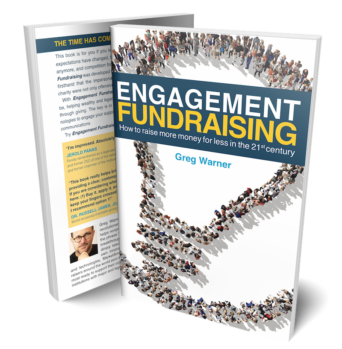We use cookies to ensure that we give you the best experience on our website. By continuing to use this site, you agree to our use of cookies in accordance with our Privacy Policy.
 Login
Login
Your Role
Challenges You Face
results
Learn
Resources
Company
Why fundraisers shouldn’t be making friends with donors


A true story.
I was talking to one of our customers two weeks ago. She had been working for an organization for almost two and a half years and she said, “You know, I think over time I must have met with about 100 people. But I don’t think even 2 or 3 were really, really, really highly qualified.”
She continued saying, “Most of them love us. They adore our staff. They understand and support our mission. They wanted to talk and I wanted to listen. Our meetings were great. We cried, we laughed—but later I asked myself, ‘Were they really the type of people who could make a tremendous impact for future generations?’ Not really.”
Let’s examine this.
So, she spent a lot of time—A LOT OF TIME—with people that she adored and who adored her and her organization. But most of them were not qualified. They weren’t worthy of her time investment. And other donors, the ones with means, the ones who already gave A LOT OF THEIR MONEY to her organization, funded all of that.
Those donors (funders) make up only 12% of her database and their gifts amount to 83% of her organization’s revenue. In fact, just 4% account for almost 50% of all donor dollars. I know because I analyzed the data.
So she used their money — money that pays her salary and covers her travel expenses — to cultivate relationships and steward wonderful people who cannot really support the mission in an immensely impactful way.
I think what she did was wrong.
And I told her so!
Remember I got into this because I was giving to an organization but later felt they were mishandling my donation dollars. That experience lays at the core of everything we do here at MarketSmart.
So, for all those reading this, let me be clear: What she did was NOT an effective and efficient use of donor dollars and it wasn’t fair to the philanthropic investors who footed the bill. Everyone doesn’t deserve a VIP experience.
Sorry but fundraising is not mostly about making friends.
Of course, those supporters deserved stewardship and cultivation. All donors deserve that. But some donors deserve the VIP experience because of what they gave and what they are capable of giving.
Sound crass? I don’t think so. I think it’s common sense and smart. But most of all, it’s fair. After all, this IS a business.
Airlines have first class seats for a reason. Stadiums have boxes. And last time I checked, I didn’t get invited to the Golden Globes or the Academy Awards just because I like movies.
Sure, you want to make friends but you have to be very judicious about your time because other donors are paying your salary to make sure that you bring in BIG dollars. That’s your job. And you need to be a good steward of their dollars by making sure that you spend your time wisely, meeting with the right people.
In other words, you want to make friends but you want to make the right friends, people who can really help the cause. Never forget that your time is money.
Try this.
Put a picture of your number one donor next to your phone. Then when you are about to make a call or arrange a visit, look at her. Think to yourself, would she want me spending my time (her money) on this person?
Do that first. Then make the call. Or, find another donor to visit.
Qualification is essential. Don’t ever forget it.
Related Posts:
>>Is donor qualification more important than donor identification?
>>Why QUALIFYING donors might be the silver bullet you’ve been looking for
LIKE THIS BLOG POST? LEAVE YOUR COMMENTS BELOW AND/OR SHARE IT WITH YOUR PEERS!
Get smarter with the SmartIdeas blog
Subscribe to our blog today and get actionable fundraising ideas delivered straight to your inbox!

Greg,
I certainly agree w/your analysis of wasted time. What about the emphasis on “friend making”? Is that the board and volunteers’ assignment?
Thanks
What do you mean by ‘friend making’? I Googled that phrase and nothing came up.
EXCELLENT, EXCELLENT!! I have a related story – I met the executive director of a small but philanthropically successful nonprofit who bragged about all the big donors he had and how much money they brought in. But then he said how that’s all going to change now that he was leaving the organization and taking all his friends with him. I thought to myself, what a fraud! What a failure! This man has done a deep disservice to his organization and his donors.
And a disservice to the profession.
By the way, I don’t believe him for a minute. He won’t be taking any donors anywhere. Fake news!
I think many people in the nonprofit sector (program and fundraising departments alike) confuse being ‘friendly’, be-friending someone, and being friends.
Often, major and planned giving professionals are required to secure a certain number of face-to-face visits each year, and this is considered a measure of their effectiveness in their role. More often than not, that number is arbitrary, and is in no way related to how many qualified donors or prospects are in the pipeline. Achieving that arbitrary visit count is too often the reason fundraisers meet with the wrong donors. Face-to-face time is best reserved for qualified donors, and when it’s the right strategic move.
Right on Nadine!
Greg, I shared your post with my fundraising team, and with the development team at a local non-profit where I serve as a Trustee. It took me a decade in fundraising to learn this, and since I did I’ve focused my efforts where it matters – donors, not buddies. You are spot on.
Wow. That’s a big complement Bradley. Thank you.
Also – would you be willing to share your thoughts on my LinkedIn Group, the Philanthropy Network? Approx. 20K development pros are there, and I’m always looking for content/contributors. Thanks for giving this some thought. Brad
Sure. I just asked to be admitted into the group. Thanks for inviting me.
A part of the problem with the fundraiser may relate to the organization itself and supervision. What information about the donor’s capability was provided to the fundraiser? I worked for an important nonprofit for many years whose CEO did not believe in donor research nor any research about the marketplace. Of course, the success of fundraisers in the field was hampered due to a lack of information about how much to ask potential donors. Additionally, the amount of funds raised were a fraction of what should have been raised by the same team because they were not asking at the level the donor was capable. Moreover, what was the supervisor doing during supervision with the fundraiser in the field. He or She should have been discussing every donor’s capability with the fundraiser using a moves management discussion.
Dr. Lankin, unfortunately this organization had no really good leadership. The fundraiser was pretty much on her own. Her boss was a specialist at getting grant money and, frankly, I have no idea what the c-level staff do. They never seem to get involved in fundraising at all. It’s a dirty word to them.
Dr. Lankin’s comment demonstrates why prospect research is an absolutely necessary component of successful fundraising. Choosing to spend your time with the prospects who are truly capable of having an impact on the organization requires you to know who they are before you schedule meetings. If the meeting is your first step in qualifying a donor, the fundraiser’s valuable (and expensive!) time is being wasted.
It’s time that prospect researchers were recognized as a crucial part of the fundraising team.
YESSSSS!!!!!!
Have to be a bit of a contrarian here, hope you can indulge me for a moment. I’ve had more than a few instances in my career where I maintained relationships with donors who weren’t even NEAR the top of the list regarding giving capacity. The wealth screening reports didn’t show vacation homes, yacht ownership or significant stock holdings from the SEC filings they scan. But I stayed in touch nevertheless and my organization was the recipient of at least 3 six-figure bequests from these generous donors. In one instance we were among six charities in a previous Will, but the one in place at death remembered only two…we were the ones who kept in touch!
I agree we’re obligated to steward the gifts we receive wisely. While good research is an essential part of effective philanthropy, it’s only one tool at our disposal. A true development professional will develop the ability to recognize these “hidden diamonds” and keep them engaged.
I appreciate all of your points Andrew. Well said!